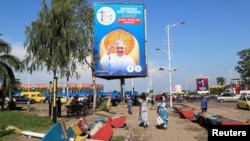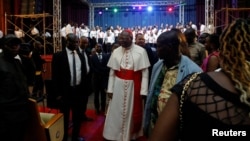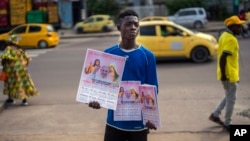Pope Francis on Tuesday is expected to land in the Democratic Republic of Congo, Africa's largest predominantly Catholic country, for a landmark three-day visit.
Here are five things to know about this vast nation:
Mineral wealth, dire poverty
The Democratic Republic of Congo is awash with minerals and precious stones, from gold, diamonds and coltan to tin, copper and cobalt.
Harboring the Congo River — the second-largest in Africa after the Nile — the Democratic Republic of Congo also has huge hydroelectric potential, as well as 80 million hectares (197 million acres) of arable land.
But decades of war and chronic mismanagement means that little of the country's enormous wealth trickles down to the population of some 100 million people.
About two-thirds of the Congolese population survive on under $2.15 a day, according to the World Bank.
Ethnic mosaic
Occupying a vast area the size of continental western Europe, the Democratic Republic of Congo is about 80 times larger than its former colonial power, Belgium.
It is the second-largest state in Africa after Algeria.

Some 250 different ethnic groups live in the Democratic Republic of Congo, speaking hundreds of different languages.
French is the country's official language, and local tongues Kikongo, Lingala, Tshiluba and Swahili are also officially recognized.
Despite its size and diversity — the former province of Katanga tried to secede in the 1960s — there is a fierce sense of national unity.
Troubled east
The Democratic Republic of Congo has been ravaged by brutal conflicts in recent decades. The first Congo war, between 1996-1997, resulted in the overthrow of dictator Mobutu Sese Seko.
The second Congo war, between 1998-2003, sucked in nine different countries, involved about 30 armed groups and caused millions of deaths according to some estimates. It also bankrupted the country.
Most of the Democratic Republic of Congo is now at peace, but its mineral-rich eastern provinces remain plagued by dozens of armed groups and civilian massacres are common.
Secular, religious
Secularism has been enshrined in the Congolese Constitution since 1974, which also recognizes freedom of worship.
According to estimates, about 40 percent of the country is Catholic, 35 percent Protestants of various denominations, nine percent Muslims and 10 percent Kimbanguists — a Christian movement born in the Belgian Congo.
Official Vatican statistics put the proportion of Catholics in the DRC at 49 percent of the population.

Atheists are exceedingly rare in Congolese society, which remains deeply religious and influenced by the church. During the colonial period, education was entrusted to Catholic missionaries.
Rumba, survival
Congolese people are renowned for their sense of humor and resourcefulness in the face of trying conditions.
Many jokingly refer to "Article 15" of the constitution, which purports to instruct citizens to sort things out themselves.

Music also plays an outsize role in the country's culture. UNESCO listed Congolese rumba as an intangible cultural heritage of humanity in December 2021.
Congo is also famed for its so-called sapeurs — dandies known for their ultra-elegant clothing and sense of style.


